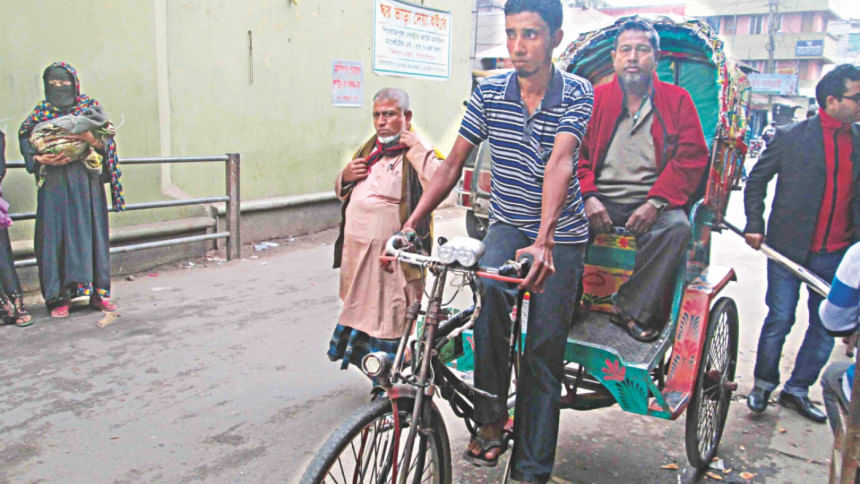A long, hard journey

Seventy-year-old day labourer Md Altaf Hossain from Nokathi village in Jhalakathi's Rajapur upazila has seven children, none of whom studied even as far as the Secondary School Certificate except one of his sons, Md Nasiruddin. Economic hardship made education elusive for the family but Nasiruddin, now 24, was determined. Unable to rely on financial support from home for his tertiary studies, Nasiruddin turned to pedal power.
“On the first day I rode rickshaw I was scared of being recognised by college classmates,” he recalls, referring to the perceived indignity of the occupation. “I rode until 9 p.m. on that first day and earned Tk. 70. My first two passengers were women.”
Even to hire a rickshaw was a challenge. It was after completing his Higher School Certificate equivalent alim exam at a madrasa in 2008 that Nasiruddin moved to Pirojpur town to enrol in Suhrawardi College. He was not well-known. He hadn't driven a rickshaw before. Rickshaw owners were cautious.
It took persistence before one agreed to entrust him with a vehicle. “On the third day I had an accident,” he says. Fortunately he escaped serious injury.
He wasn't dissuaded. “After a few hours' morning study I'd set off on rickshaw around 10 a.m.,” he says. “I rode until late afternoon which limited study time and besides, it's quite difficult to sit at a desk after rickshaw riding. But it was the only way.”
Nasiruddin's education efforts stem from a childhood passion for English. His interest in the language was further piqued after his dakhil exam, when he was sent to work at a garment factory in Dhaka. “At the factory I saw that people who knew English are valued,” he says, “I understood that to get a good job, education is a must.”
He returned home to complete his secondary schooling, knowing that after that he was on his own. “My father tried to support my education,” he says, “but I knew he couldn't bear the expenses anymore.”
With a GPA of over 4 in both dakhil and alim exams he secured his college admission, and for a time covered living costs working as a tutor. But as fate would have it, after twelve months his father fell ill, leaving Nasiruddin financially responsible for his parents and a younger sister. It was then the idea of rickshaw riding first presented itself.
“Nasiruddin is different to other students,” says Md Kamal Hossain, clerk of the college's English department. “Although he can't attend classes regularly he visits the department often to collect books.”
“He's a good student,” says classmate Jahid Khan Titu, “But he rarely attends. If he had the chance to attend regularly he must achieve top results.”
Nonetheless last year Nasiruddin graduated with a Bachelor of Arts with Honours. This year, with money borrowed from the rickshaw owner, he's enrolled in a Master's degree course.
In the meantime, he learnt not to be ashamed of rickshaw driving. “I used to avoid anyone I knew if I saw them on the street,” he says, “but classmates took the matter easily. Sometimes they even enquired how it was going.”
For a time Nasiruddin also attended private English classes. While that proved cost prohibitive, one habit that endured is to read The Daily Star. “I've read the newspaper daily for years,” he says, “It really helps.”
More recently Nasiruddin finally traded in his handlebars for a motorised auto-rickshaw which he rents for Tk 230 per day. “I can't make more than Tk 200 daily profit,” he says, “but it's easier than pedalling.”
As for his passengers, few would imagine their driver is on his way to becoming a Master's graduate, just as his parents never could have thought one of their children could achieve what Nasiruddin has.
“My son has worked hard for us all, not only for himself,” says proud mother Ambiya Khatun. “I don't know how long he will have to struggle. I always pray for him.”
About the future, Nasiruddin is anxious. “I'd like a good job,” he says, “but they're not easy to get.” Despite his achievements, one obstacle might be that his tertiary results don't reflect Nasiruddin's ability as much as the prolonged struggle which prevented regular class attendance.
Nevertheless, if the past is any indicator one thing is clear: Nasiruddin will never stop trying.

 For all latest news, follow The Daily Star's Google News channel.
For all latest news, follow The Daily Star's Google News channel. 








Comments